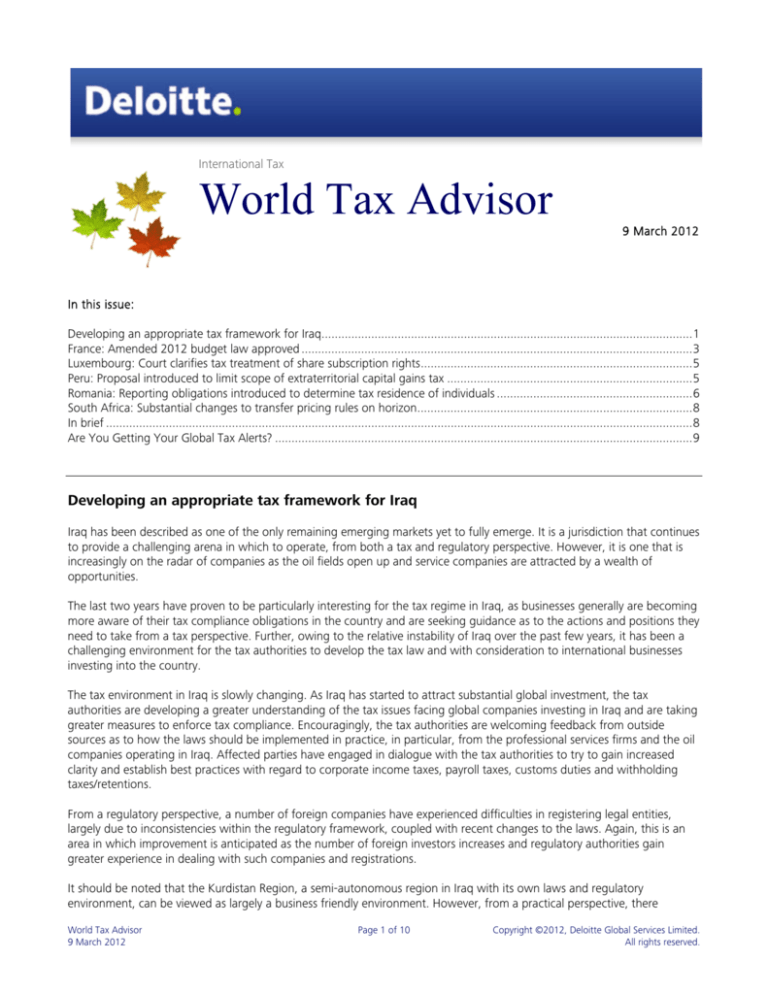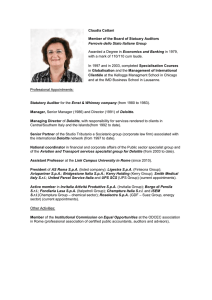
International Tax
World Tax Advisor
9 March 2012
In this issue:
Developing an appropriate tax framework for Iraq................................................................................................................ 1
France: Amended 2012 budget law approved ...................................................................................................................... 3
Luxembourg: Court clarifies tax treatment of share subscription rights .................................................................................. 5
Peru: Proposal introduced to limit scope of extraterritorial capital gains tax .......................................................................... 5
Romania: Reporting obligations introduced to determine tax residence of individuals ........................................................... 6
South Africa: Substantial changes to transfer pricing rules on horizon ................................................................................... 8
In brief ................................................................................................................................................................................. 8
Are You Getting Your Global Tax Alerts? .............................................................................................................................. 9
Developing an appropriate tax framework for Iraq
Iraq has been described as one of the only remaining emerging markets yet to fully emerge. It is a jurisdiction that continues
to provide a challenging arena in which to operate, from both a tax and regulatory perspective. However, it is one that is
increasingly on the radar of companies as the oil fields open up and service companies are attracted by a wealth of
opportunities.
The last two years have proven to be particularly interesting for the tax regime in Iraq, as businesses generally are becoming
more aware of their tax compliance obligations in the country and are seeking guidance as to the actions and positions they
need to take from a tax perspective. Further, owing to the relative instability of Iraq over the past few years, it has been a
challenging environment for the tax authorities to develop the tax law and with consideration to international businesses
investing into the country.
The tax environment in Iraq is slowly changing. As Iraq has started to attract substantial global investment, the tax
authorities are developing a greater understanding of the tax issues facing global companies investing in Iraq and are taking
greater measures to enforce tax compliance. Encouragingly, the tax authorities are welcoming feedback from outside
sources as to how the laws should be implemented in practice, in particular, from the professional services firms and the oil
companies operating in Iraq. Affected parties have engaged in dialogue with the tax authorities to try to gain increased
clarity and establish best practices with regard to corporate income taxes, payroll taxes, customs duties and withholding
taxes/retentions.
From a regulatory perspective, a number of foreign companies have experienced difficulties in registering legal entities,
largely due to inconsistencies within the regulatory framework, coupled with recent changes to the laws. Again, this is an
area in which improvement is anticipated as the number of foreign investors increases and regulatory authorities gain
greater experience in dealing with such companies and registrations.
It should be noted that the Kurdistan Region, a semi-autonomous region in Iraq with its own laws and regulatory
environment, can be viewed as largely a business friendly environment. However, from a practical perspective, there
World Tax Advisor
9 March 2012
Page 1 of 10
Copyright ©2012, Deloitte Global Services Limited.
All rights reserved.
continues to be a degree of uncertainty as to the extent of interaction between Kurdistan Region law and the laws of
federal Iraq. For example, we understand that federal Iraq generally does not recognize the Kurdistan Region’s authority to
implement its own tax laws, which the Kurdistan Region has done since 2007. This is an area that may potentially come
under increased scrutiny as oil production in the Kurdistan Region grows.
Key developments and areas of focus
Oil and gas tax law – The oil and gas tax law passed in 2010 provides for a corporate income tax rate of 35% applicable to
“oil and gas companies” operating in Iraq. The oil and gas tax law is supported by guidance (Instructions No. 5 of 2011)
formally published in December 2011 that define specific activities falling within the scope of the law. While a rate of 35%
on oil and gas activities is relatively low compared to other rates in the region (for example, the tax rate on oil and gas
activities is 57% in Kuwait and can be as high as 85% in the United Arab Emirates and Saudi Arabia), the instructions
include a broad range of activities that should fall within the scope of the oil and gas law, including all activities that relate
to the extraction of oil and gas up to the point where it is ready for pumping to export ports. As such, the 35% rate is likely
to apply not only to all upstream oil and gas companies, but also to certain subcontractors and supporting industries
operating in Iraq.
Service companies should be aware that, where they contract to perform services not normally expected to fall within the
definition of “upstream oil and gas activities” under the oil and gas tax law, there may be a risk (depending on how the
contract is worded) that the tax authorities will assume that the contract relates to upstream activities and seek to apply tax
at a rate of 35%. Therefore, it is critical that companies be well prepared to deal with the tax authorities to avoid suffering
what they may consider an unfair tax assessment.
Tax retentions – In line with the increased rate of tax for the oil and gas industry, the applicable rates of tax retentions for
contracts relating to upstream oil and gas activities have been increased to 7% and must be paid to the tax authorities
within 30 days of making the contract payment. The published instructions also provide that these new provisions should
be applied retroactively from 15 March 2010, which is likely to cause concern for a number of the international oil
companies and service companies, and may be disputed.
For non-oil and gas contracts, there is currently a lack of transparency on the correct rate of retention to be applied, with
contractors generally suffering any rate between 1.6% and 6% (according to the law, the maximum rate of tax that may be
retained is 10%, although this does not appear to have been applied in practice).
A number of amendments to the law are being proposed to the tax authorities, including a proposal to replace the current
system of retentions with one of a final withholding system to facilitate tax compliance for nonresidents operating in Iraq
under short-term contracts. Another proposed amendment involves the introduction of a mechanism to allow retentions to
be made at a lower rate, or for contractors to obtain a refund of tax, where the amounts retained can be demonstrated to
be in excess of the final tax liability of the contractor. We expect further updates from the tax authorities in the near future.
The tax authorities have stressed that, while they welcome the ideas of taxpayers, any amendments to the current
Instructions must be made within the existing tax and regulatory framework in Iraq. It will be interesting to see how this
develops over the coming months.
Taxation of individuals – Personal income tax compliance in Iraq continues to be a challenge, particularly for employers of
frequent business travelers to the country. Employers need to be aware that individuals should be subject to income tax,
currently imposed at progressive rates up to 15%, on income that “arises in Iraq” from the first day they travel to Iraq, in
accordance with Iraqi tax law. This provision strictly requires employers to withhold tax from the salaries of all of their
employees working in Iraq, including any rotators. The position is complicated, however, by the fact that there currently is
no mechanism for an Iraqi entity to pay tax on behalf of a nonresident, and further, attempting to do so may expose the
nonresident company to corporate tax on the basis that it is considered to be “trading in Iraq.” This represents a significant
risk to employers if left unaddressed. Employers should closely monitor this issue where it is anticipated that personnel will
be required to travel to Iraq on a frequent basis.
Social security – The Iraqi social security authorities have confirmed that they may be willing to exempt expatriate
employees working in Iraq from making social security contributions in Iraq in cases in which they are able to demonstrate
that they are covered by retirement and social security benefits in their home countries. This is the first time the authorities
World Tax Advisor
9 March 2012
Page 2 of 10
Copyright ©2012, Deloitte Global Services Limited.
All rights reserved.
have suggested any formal structure or process to obtain an exemption and it will be interesting to see how this is
implemented in practice.
Summary
Overall, Iraq continues to provide a challenging environment for foreign investors, both for long- term operators in Iraq and
new entrants to the market. There are, however, signs of change for the better, and progress is gradually being made. We
will continue to work closely with the tax authorities and key stakeholders in Iraq over the coming months to obtain greater
clarity on the implementation and practical application of the existing legislation and developments with respect to new and
proposed laws.
—
Alex Law (Dubai)
Director
Deloitte United Arab Emirates
alexlaw@deloitte.com
Jayne Stokes (Dubai)
Manager
Deloitte United Arab Emirates
jstokes@deloitte.com
France:
Amended 2012 budget law approved
Amendments to the 2012 budget law concerning corporate tax, VAT and tax audits have been approved and will be final
once the president signs the law and it is published in the Journal Officiel.
Corporate Tax
Taxes on financial transactions – As announced in February 2012, France intends to unilaterally impose a financial
transactions tax. The government has approved three separate taxes, which will apply as from 1 August 2012:
1. A tax of 0.1% on the acquisition of listed shares of French companies where there is a transfer of legal title to the
shares (as defined under the Monetary and Financial Code), the shares are listed on a regulated market (in France
or in another country) and the shares are issued by a company headquartered in France whose market
capitalization exceeds EUR 1 billion as at 1 January of the tax year. A list of affected companies will be published.
The financial transactions tax, however, will not apply to the following:
• Purchases made through an issuance of equity securities;
• Intragroup transfers;
• Acquisitions subject to the special regime for mergers and similar transactions;
• Acquisitions made under employee savings schemes; and
• Acquisitions of bonds exchangeable for, or convertible into, shares. However, the tax will apply at the time of
conversion or exchange of the bonds.
The financial transactions tax will be based on the value of the acquired shares and will be due by the operator
providing the investment services, but collected and paid to the Treasury by the central security depositories (e.g.
Euroclear France). Account holders will have to provide information to central depositories so they can properly
fulfill their obligations. Stringent penalties will apply for failure to comply (i.e. an additional 20% to 40% of the tax
due will be imposed).
2. A 0.01% tax will apply to French resident companies carrying out high frequency trading of equity securities for
their own account. High frequency transactions are defined as orders carried out on a regular basis using an
automated processing mechanism, characterized by the sending, modification or cancellation of successive orders
on a given security within a very short period of time (the definition of “short period” will be defined by a decree).
The tax will be due as soon as the rate of cancellation or modification of orders within the scope of the tax exceeds
a certain threshold on a single stock exchange trading day on the amount of the aggregate value indicated in the
orders canceled or changed.
3. A 0.01% tax will apply to “naked” credit default swaps on EU member states entered into after 1 August 2012.
However, the EU Parliament has approved a law banning such instruments on member states, and if this ban
becomes effective before August, this new tax might never be applied.
World Tax Advisor
9 March 2012
Page 3 of 10
Copyright ©2012, Deloitte Global Services Limited.
All rights reserved.
Apprenticeship tax – Companies with more than 250 employees that do not reach a 4% apprentice threshold are subject
to an additional contribution in the form of an Apprenticeship Tax, equal to 0.1% of gross payroll. The threshold will be
increased to 5% as from 2015.
Registration duties on transfers of shares – The scope and rate of registration duties on transfers of shares were modified
in the 2012 budget law announced in December 2011, with the changes coming into effect on 1 January 2012. Under the
new rules, different rates apply, depending on the amount of the transaction: 3% below EUR 200,000; 0.5% between EUR
200,000 and EUR 500 million; and 0.25% over EUR 500 million. Under the amended 2012 budget law, as from 1 August
2012, the rate of registration duties on the transfer of shares will be 0.1% regardless of the transaction amount.
The previous budget law clarified that, for listed shares, the sale of shares in joint stock companies (SAs, SASs and SCAs) will
be subject to registration duty in France if there is a deed and the deed was signed abroad. This provision is unchanged, but
the new law amends the exemptions for transactions taking place on or after 1 August 2012:
•
•
•
The exemption for a company’s purchase of its own shares will apply only to shares held for resale to the
company’s employees within the framework of a company savings plan;
The exemption for transactions between members of the same tax group is extended to companies within a group
as defined by the Commercial Code; and
Transactions falling within the scope of the new financial transactions tax will be exempt from registration fees.
Repurchase of shares of unlisted companies – Unlisted companies will have the same right as listed companies to buy
back their own shares subject to the following conditions:
•
•
•
Redemption for a payment or exchange of assets as part of an external expansion, merger, demerger or
contribution will be limited to a 5% stake in the company;
The redemption costs will have to be met exclusively out of distributable reserves; and
Proceeds from the sale will not be considered distributed income for tax purposes, but will be subject to taxation
as capital gains.
An unlisted company’s purchase of its own shares will be subject to registration duties.
Social tax – The rate of social tax is increased to 5.4% from 3.4%, thus increasing the overall rate of social taxes on passive
income from 13.5% to 15.5%. This increase applies to capital income derived on or after 1 January 2012 and to dividends
and interest paid or accrued on or after 1 July 2012.
VAT
The Amended budget law makes two significant changes to the VAT rules:
•
•
The standard rate of VAT will increase from 19.6% to 21.2% for transactions taking place as from 1 October 2012.
However, sales of buildings to be constructed will remain subject to the 19.6% rate provided the contract is
registered with a notary or a tax service before the date the law is published in the Journal Officiel (likely midMarch 2012).
The reverse charge mechanism will apply to electronic communication services and deliveries of gas or electricity.
To prevent “carousel” fraud with respect to deliveries of natural gas and electricity and electronic communication
services, France requested permission from the European Commission to introduce a special measure to implement
the reverse charge mechanism that applies to other types of services. The new law provides that, as from 1 April
2012, the VAT due on the delivery of these services will be paid by the purchaser.
Other
•
A taxpayer that fails to comply with the obligation to declare bank accounts held abroad currently is subject to a
penalty up to EUR 1,500 (EUR 10,000 if the bank account is held in a “non-cooperative” jurisdiction). The penalty
will amount to the higher of:
o EUR 1,500 or EUR 10,000; or
o 5% of the credit balance of the undeclared account held abroad, if higher than EUR 50,000.
World Tax Advisor
9 March 2012
Page 4 of 10
Copyright ©2012, Deloitte Global Services Limited.
All rights reserved.
•
The criminal penalty for tax evasion will be increased from EUR 37,500 to EUR 500,000 and from EUR 75,000 to
EUR 750,000 if the fraud is perpetuated by purchases or sales without invoices or bills not relating to real
operations, or when the purpose was to obtain an unjustified refund from the government. When tax evasion
involves a non-cooperative jurisdiction, the imprisonment penalty will be increased from five to seven years and the
fine to EUR 1 million.
This material has been prepared by professionals in Taj, French tax and legal firm, member of Deloitte Touche Tohmatsu
Limited.
—
Ambroise Bricet (Paris)
Partner
Taj
abricet@taj.fr
Patrick Fumenier (Paris)
Partner
Taj
pfumenier@taj.fr
Marie Pierre Hôo (Paris)
Director
Taj
mhoo@taj.fr
Luxembourg:
Court clarifies tax treatment of share subscription rights
The Luxembourg Administrative Appeals Court issued a decision on 16 February 2012 that broadens the scope of the
domestic participation exemption to include gains derived from the disposal of preferential share subscription rights. The
appeals court overturned decisions of the Administrative Court issued on 30 June and 14 July 2011.
Share subscription rights are rights to subscribe for shares in cash where the shares are offered on a pre-emptive basis to
shareholders in proportion to the capital represented by their existing shares. Such rights, however, may be sold to a third
party.
In the case before the Administrative Appeals Court, the Luxembourg tax authorities and the Administrative Court had
determined that gains from the disposal of share subscription rights cannot benefit from the Luxembourg participation
exemption for capital gains because the definition of share subscription rights differs from that of a participation within the
meaning of the participation exemption.
The Administrative Appeals Court disagreed, concluding that, although share subscription rights have their own form and
may be negotiated independently from the proportion of capital held by the shareholders, such rights may not be
considered as having an autonomous existence, but have to be viewed as an attribute of the existing shares. The disposal of
share subscription rights must be equated to a partial disposal of a company shareholding and, therefore, can benefit from
the participation exemption.
—
Georges Deitz (Luxembourg City)
Partner
Deloitte Luxembourg
gdeitz@deloitte.lu
Peru:
Proposal introduced to limit scope of extraterritorial capital gains tax
A bill presented to the Peruvian Parliament on 28 February 2012 contains a measure to ease the tax burden on certain
foreign corporate reorganizations involving a direct or indirect transfer of shares in a Peruvian company. The capital gains
tax applicable to foreign alienations of Peruvian shares is creating difficulties in the application of commonly accepted tax
planning structures.
World Tax Advisor
9 March 2012
Page 5 of 10
Copyright ©2012, Deloitte Global Services Limited.
All rights reserved.
Peru’s capital gains tax rules have undergone several changes in recent years. Capital gains derived by domestic or foreign
investors from the sale of shares of a Peruvian corporation are deemed to be Peruvian-source income, although until 31
December 2009, such gains were exempt from capital gains tax in certain circumstances. As from 1 January 2010, gains
derived from a direct alienation of shares issued by a Peruvian entity fall within the Peruvian tax net and are taxed at rates of
up to 30%, regardless of the residence status of the transferor. These rules were extended in 2011 when measures were
introduced to bring capital gains derived from certain indirect alienations within the scope of Peru’s capital gains tax. The
implementation of the latter rules has created practical issues that can adversely impact foreign investors, in particular, in
connection with restructuring strategies and holding structures.
Domestic and foreign corporate reorganizations
The concept of “alienation” under the Peruvian income tax law encompasses a sale, barter, capital contribution,
expropriation and, in general, any disposition involving the transfer of property rights for consideration.
A domestic corporate reorganization (e.g. merger, spin off) involving a direct or indirect transfer of the shares in a Peruvian
company qualifies as an alienation. However, in a purely domestic reorganization, provided there is no change in the
controlling interest in the company concerned, the transfer will not constitute a taxable event for the transferor and any
gain reflected in the accounting records as a result of the reorganization will fall outside the scope of the capital gains tax
because it will not qualify as a realized gain for tax purposes. (The rules in the Income Tax Act on corporate reorganizations
involving only Peruvian residents allow assets to be transferred without triggering the “market value” provisions and, subject
to certain conditions, share exchanges to be achieved without giving rise to taxable capital gains). This is not the case,
however, for foreign corporate reorganizations, where the transfer will constitute an alienation for Peruvian tax purposes
and, in the absence of a specific exemption, any gains arising will be subject to tax in Peru.
The different criteria for qualifying for an exemption from the capital gains tax where Peruvian shares are transferred in a
corporate reorganization (i.e. in a domestic versus a foreign reorganization) within the same economic group could
adversely impact foreign investors. Foreign transactions are likely to be subject to a 30% tax on the fair market value of the
shares if a certificate of tax basis is not issued by the tax authorities before the reorganization is completed.
The Legislative Project would amend the income tax law to provide that a direct or indirect alienation of shares in a Peruvian
company in the course of a corporate reorganization between nonresident companies would be subject to capital gains tax
only if, as a result of the transaction, the shares are no longer part of the same economic group.
Comments
If approved, the Legislative Project would eliminate the disparities in the scope of the capital gains tax where Peruvian
shares are transferred in a foreign reorganization. It also would achieve the new government’s policy to increase revenue,
but at the same time would not create any disincentive to investment. Ultimately, the changes would encourage structures
involving the holding of shares in Peruvian companies by providing certainty and improving the competitiveness of Peru as
compared to other Latin American countries.
—
Gustavo Lopez-Ameri (Lima)
Partner
Deloitte Peru
glopezameri@deloitte.com
Ana Luz Bandini (New York)
Senior Manager
Deloitte Tax LLP
anbandini@deloitte.com
Romania:
Reporting obligations introduced to determine tax residence of individuals
Order No. 74/2012, published in Romania’s official gazette on 30 January 2012 and applicable from that date, implements
new reporting obligations for individuals entering or leaving Romania under certain circumstances in order to assess their
tax residence status.
World Tax Advisor
9 March 2012
Page 6 of 10
Copyright ©2012, Deloitte Global Services Limited.
All rights reserved.
Covered persons
The order applies to nonresident individuals arriving in Romania and resident and nonresident individuals leaving the country
if the relevant period (or periods) in or outside Romania, as the case may be, will exceed 183 days in the aggregate. Such
individuals will be required to complete and submit a questionnaire for purposes of establishing their future residence for
tax purposes.
For nonresident individuals intending to leave Romania, however, the reporting requirement will apply only if: (1) the
individual arrived in Romania after 1 January 2009 and continues to stay in Romania after 1 January 2012; or (2) the
individual arrived in Romania before 1 January 2009 and has requested a tax residence certificate from the Romanian tax
authorities.
Forms
The completed questionnaire must be submitted to the tax office where the individual has his/her registered domicile in
Romania and may be submitted either by the individual or a person authorized by the individual to file on his/her behalf.
The order provides templates of the questionnaire required to determine Romanian residence, as well as templates for the
notifications to be issued by the tax authorities regarding their analysis of submitted questionnaires and determinations of
residence. The following documents must be submitted along with the tax residence questionnaire:
•
•
•
A copy of the individual’s passport (for EU citizens, any identification document issued by the individual’s home
state may be used);
A tax residence certificate issued by foreign tax authorities (if applicable); and
Proof of accommodation in Romania.
The questionnaire addresses the following: reasons for arrival/departure in/from Romania; the individual’s employment
relationship in Romania/abroad; family situation (i.e. arrival/departure together with the individual’s spouse, minor children
or other dependent individuals); ownership of a car registered in Romania/abroad and of a passport or driver’s license; and
insurance within the health and pensions systems in Romania/abroad.
Residence criteria
The order also transposes into Romania’s domestic legislation the tax residence criteria established by the OECD Model
Treaty:
•
•
If the individual is a resident of both Romania and another jurisdiction with which Romania has signed an income
tax treaty, the criteria to determine residence include the individual’s domicile, center of vital interests, habitual
abode and nationality;
For individuals who do not hold proof of residence in a treaty partner jurisdiction, the relevant factors for
determining residence will be the individual’s presence in Romania in excess of 183 days in the aggregate during
the calendar year or the establishment of the individual’s center of vital interests in Romania.
Order No. 74/2012 also is relevant to changes introduced in 2011 that require a foreign individual to declare his/her
worldwide income in Romania starting with the second year of being present in the country (previously, a three-year
exemption was in place). For example, a U.K. citizen arriving in Romania in March 2012 for a three-year assignment must,
after 183 days of being present in Romania, submit a tax residence assessment file to the Romanian tax authorities based
upon which his/her residence status will be decided. This could entail being assessed as tax resident in Romania for 2012
(based on presence), followed by being taxable on worldwide income starting in 2013.
Deadlines
Nonresident individuals entering Romania must submit the questionnaire within 30 days of completing a 183-day stay in
Romania. The tax authorities will issue their decision on the individual’s residence status within 30 days following
submission of the questionnaire. Resident individuals leaving Romania must submit the questionnaire at least 30 days before
departure, and the tax authorities will issue a decision as to whether the resident will continue to be treated as such for tax
purposes within 15 days.
World Tax Advisor
9 March 2012
Page 7 of 10
Copyright ©2012, Deloitte Global Services Limited.
All rights reserved.
Departing individuals whose residence status changes as a result of their departure may be exempt from liability to tax in
Romania on worldwide income until their repatriation. Further, Romanian residents who move to a country that has not
signed a tax treaty with Romania must pay tax on their worldwide income in Romania for three calendar years following
their departure from Romania.
—
Pieter Wessel (Bucharest)
Partner
Deloitte Romania
pwessel@deloittece.com
Raluca Bontas (Bucharest)
Senior Manager
Deloitte Romania
rbontas@deloittece.com
South Africa:
Substantial changes to transfer pricing rules on horizon
Amendments to South Africa’s transfer pricing rules governing cross-border related party transactions will significantly
impact business relationships by placing greater accountability on taxpayers and carrying far-reaching implications for
noncompliance.
As from 1 April 2012, the revised rules shift the focus from the arm’s length pricing of related party transactions to include
all aspects of the economic relationship between the parties. Taxpayers will have to demonstrate that all terms and
conditions of the relationship are arm’s length in nature and satisfy the South African Revenue Service (SARS) that both
parties’ day-to-day business activities are consistent with the information presented in their annual tax returns.
Key for business is the change that gives SARS discretion to make transfer pricing adjustments. The burden is now on the
taxpayer to make those adjustments on its tax return where the relationship is not at arm’s length. Failure to comply could
lead to penalties or interest that was previously unlikely to have been successfully imposed.
Adjustments will automatically result in a deemed loan by the taxpayer, who must then account for interest at an arm’s
length interest rate. This interest will have to be accounted for indefinitely unless the taxpayer charges or recovers the nonarm’s length amount from the foreign party.
Noncompliance costs thus include underpaying income tax, the resultant penalties and interest and income tax on interest
for each subsequent year because of the deemed loan. Taxpayers currently must disclose whether they have a transfer
pricing policy document in their income tax return.
The absence of documentation, together with SARS increasing focus on transfer pricing audits, boosts the likelihood of an
audit when viewed in conjunction with significant cross-border transactions.
The continued focus on transfer pricing means the potential cost of noncompliance becomes far greater.
—
Bradley Pearson (Durban)
Director
Deloitte South Africa
brpearson@deloitte.co.za
Daveena Naicker (Durban)
Consultant
Deloitte South Africa
dnaicker@deloitte.co.za
In brief
Argentina – As from 2 February 2012, all importers are required to submit a sworn declaration of importation on tangible
goods, intellectual property and services imported for consumption in Argentina. The declaration must include specific data
about the importer of record, the imported goods and why the imported goods are needed. The declaration is to be
submitted to the Argentine Federal Administration of Public Income (AFIP) for approval before the purchase order is made.
Imported merchandise will be prohibited from entering Argentina if AFIP approval is not obtained.
Cyprus – The standard VAT rate increased from 15% to 17% as from 1 March 2012.
World Tax Advisor
9 March 2012
Page 8 of 10
Copyright ©2012, Deloitte Global Services Limited.
All rights reserved.
Indonesia – The Directorate General of Taxation (DGT) has issued a circular announcing its intention to ensure compliance
with the electronic filing obligation for certain VAT taxpayers. As from January 2011, taxpayers that report more than 25
documents within a tax period (including the output and input tax invoice, import and export declaration and cancellation
notes) are required to submit an electronic return. The circular confirms that a hard copy of the return is not permitted and
the DGT has instructed the tax authorities to reject such VAT returns and impose administrative penalties on the taxpayer. If
such a rejection results in the late submission of the VAT return, the penalty is INR 500,000 per month.
Namibia – The 2012-2013 budget contains measures to modernize the tax system through an integrated computerized
system, the establishment of specialized tax offices and a strengthening of internal audit capacity. Also announced are a
voluntary tax compliance initiative, a simplified special tax system for small and medium-sized businesses and the
undertaking of a study to investigate the viability of an autonomous Revenue Authority. Among the tax measures are the
introduction of a 0% to 2% export levy on natural resources; a revised corporate tax rate for non-diamond mining
companies; an environmental levy on a range of environmentally harmful products; and the introduction of a transfer duty
on the sale of shares in companies owning fixed property and mineral rights or licenses.
Are You Getting Your Global Tax Alerts?
Throughout the week, Deloitte provides commentary and analysis on developments affecting cross-border transactions on
a free subscription basis delivered straight to your email. Read the recent alerts below or visit the archive.
Subscribe: http://www.deloitte.com/view/en_GX/global/insights/browse-by-content-type/email-alerts/index.htm
Archives: http://www.deloitte.com/view/en_GX/global/services/tax/international-tax/article/c18d173f622d2210VgnVCM100000ba42f00aRCRD.htm
Australia
Changes proposed to strengthen general antiavoidance rule
The government has announced that it will strengthen the general anti-avoidance rule, known as Part IVA, to ensure that
the provision “continued to be effective in countering tax avoidance schemes that are carried out as part of broader
commercial transactions.” [Issued: 2 March 2012]
URL: http://www.deloitte.com/view/en_GX/global/services/tax/international-tax/b17507eeb52e5310VgnVCM3000001c56f00aRCRD.htm
URL: http://www.deloitte.com/assets/Dcom-Global/Local%20Assets/Documents/Tax/Alerts/dttl_tax_alert_Australia_020312.pdf
Brazil
Government revises definition of “short-term” for purposes of IOF on foreign loans
The government has changed the definition of “short term” for foreign loans and bond issues, from an average term of 720
days to an average term of three years, for purposes of determining the applicable rate of the financial transactions tax.
[Issued: 2 March 2012]
URL: http://www.deloitte.com/view/en_GX/global/services/tax/international-tax/3de8bff6972e5310VgnVCM3000001c56f00aRCRD.htm
URL: http://www.deloitte.com/assets/Dcom-Global/Local%20Assets/Documents/Tax/Alerts/dttl_tax_alert_Brazil_020312.pdf
World Tax Advisor
9 March 2012
Page 9 of 10
Copyright ©2012, Deloitte Global Services Limited.
All rights reserved.
Have a question?
If you have needs specifically related to this newsletter’s content, send us an email at
clientsandmarketsdeloittetax@deloitte.com to have a Deloitte Tax professional contact you.
About Deloitte
Deloitte refers to one or more of Deloitte Global Services Limited, a UK private company limited by
guarantee, and its network of member firms, each of which is a legally separate and independent
entity. Please see www.deloitte.com/about for a detailed description of the legal structure of Deloitte
Global Services Limited and its member firms.
“Deloitte” is the brand under which tens of thousands of dedicated professionals in independent firms
throughout the world collaborate to provide audit, consulting, financial advisory, risk management,
and tax services to selected clients. These firms are members of Deloitte Touche Tohmatsu Limited
(DTTL), a UK private company limited by guarantee. Each member firm provides services in a particular
geographic area and is subject to the laws and professional regulations of the particular country or
countries in which it operates. DTTL does not itself provide services to clients. DTTL and each DTTL
member firm are separate and distinct legal entities, which cannot obligate each other. DTTL and each
DTTL member firm are liable only for their own acts or omissions and not those of each other. Each
DTTL member firm is structured differently in accordance with national laws, regulations, customary
practice, and other factors, and may secure the provision of professional services in its territory
through subsidiaries, affiliates, and/or other entities.
Disclaimer
This publication contains general information only, and none of Deloitte Global Services Limited, its
member firms, or its and their affiliates are, by means of this publication, rendering accounting,
business, financial, investment, legal, tax, or other professional advice or services. This publication is
not a substitute for such professional advice or services, nor should it be used as a basis for any
decision or action that may affect your finances or your business. Before making any decision or taking
any action that may affect your finances or your business, you should consult a qualified professional
adviser. None of Deloitte Global Services Limited, its member firms, or its and their respective affiliates
shall be responsible for any loss whatsoever sustained by any person who relies on this publication.
World Tax Advisor
9 March 2012
Page 10 of 10
Copyright ©2012, Deloitte Global Services Limited.
All rights reserved.







